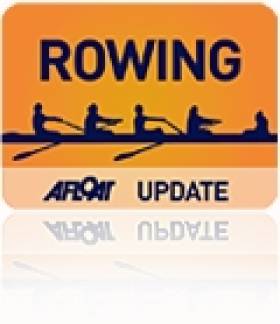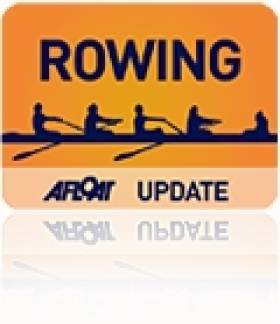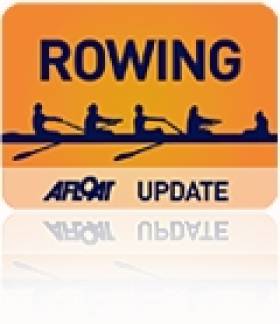Displaying items by tag: Trinity,
Gráinne Mhaol Win Men's Four at Irish Rowing Championships
#IrishRowingChampionships: Alan Martin won his eighth senior fours title as Gráinne Mhaol laid down a marker for the senior eights on the first day of the the Irish Rowing Championships in Cork today. The experienced crew of Martin, Dave Mannion, Cormac Folan and James Wall were quickly joined by another Gráinne Mhaol winner in Niall Kenny, taking his second successive title in the lightweight single sculls.
Trinity brought their tally of wins up to three when the men’s novice eight and women’s intermediate eight added to the earlier win by the women’s intermediate pair. Three Castles matched their surprise win in the men’s senior double with a more predictable victory in the women’s double by Eimear Moran and Helen Walshe.
Skibbereen’s junior women’s four gave them their only Championship win of the day, while St Joseph’s of Galway took the junior men’s eight – their third in-a-row.
Irish Rowing Championships, National Rowing Centre, Farran Woods, Day One (Selected Results; Finals)
Men
Eight, Junior: 1 St Joseph’s 6:49, 2 Portora 6:54, 3 Neptune 6:58. Novice: 1 Trinity 6:50, 2 UCD 6:56, 3 UCC 7:01.
Four – Senior: 1 Grainne Mhaol (D Mannion, A Martin, C Folan, J Wall) 6:51, 2 St Michael’s 6:59, 3 UCD 7:00.
Intermediate, coxed: 1 UCC 7:14, 2 NUIG A 7:20, 3 Trinity A 7:22.
Sculling, Double – Senior: 1 Three Castles (R Corcoran, E Grigalius) 7:09.86, 3 Commercial 7:17.43, 3 Skibbereen 7:17.51.
Single – Senior Lightweight: 1 Grainne Mhaol (N Kenny) 8:09, 2 Clonmel (A Prendergast) 8:19, 3 Skibbereen (A Burns) 8:30.
Junior 18: 1 Shannon (C Carmody) 8:43, 2 St Michael’s (O’Malley) 8:48, 3 Belfast BC (McKillan) 9:05.
Women
Eight, Intermediate: 1 Trinity 7:47, 2 Galway RC 7:49, 3 UCD A 7:50.
Four – Senior: 1 Cork/NUIG (F Judge, M O’Neill, A Wickham, L Dilleen) 7:33.22, 2 Skibbereen/Killorglin 7:33.52, 3 St Michael’s 7:25.21. Novice, coxed: 1 Commercial 8:11, 2 NUIG 8:14, 3 Queen’s 8:24. Junior: 1 Skibbereen 8:18, 2 Cork BC 8:29, 3 St Michael’s 8:40.
Pair – Intermediate: 1 Trinity (G Crowe, S O’Brien) 9:22, 2 St Michael’s 9:42, 3 Commercial 9:47.
Sculling, Double – Senior: 1 Three Castles (H Walshe, E Moran) 8:13, 2 St Michael’s 8:25.
Junior: 1 Belfast BC (J English, B Jacques) 8:21, 2 Cork BC 8:32, 3 Castleconnell 8:41.
# ROWING: Ireland’s only eight competing at Henley Royal Regatta bowed out of the Temple Cup today. Trinity led the University of Michigan at the Barrier and Fawley (roughly halfway). A push by Trinity was ineffective, but the Americans staged their own which took them into the lead. They took control and won by one and a quarter lengths.
Henley Royal Regatta, Day One (Irish interest)
Temple Cup (Eights, Student): University of Michigan (USA) bt Trinity 1 ¼ l, 7:12
Prince Albert Cup (Coxed Fours, Student): Imperial College bt Queen’s University 1¾ l, 8:07
Wyfold Cup (Fours, Club): Cork BC bt Cardiff City 1l, 7:52; Rob Roy bt Henley B 4l, 7:56
Rowing Twins Take Each Other On in Gannon Cup
Twin brothers Turlough and Patrick Hughes (20) will vie for dominance in the Gannon Cup, the annual colours race between Trinity and UCD, on the Liffey on Bank Holiday Monday. UCD, who will be seeking their fifth consecutive Gannon, will be stroked by Turlough Hughes, while Patrick will be in the five seat in the Trinity boat. UCD’s Dave Neale will be seeking his fifth Gannon Cup title.
Trinity’s women’s eight, winner of two of the last three Corcoran Cups, have experience in their crew for Monday. Sinead Rodger and Keira Buttanshaw compete in their second Corcoran Cup; Susannah Cass her third and Caitlin Condon, an American, her fourth. UCD Ladies Boat Club have yet to announce their crew.
Mark Pollock, the adventurer who competed in the Gannon in 1995, 1996 and 1997 – and won all three - will be the guest of honour at the event. Pollock has shown tremendous fortitude in taking on blindness and then, separately, paralysis sustained in a fall.
Men’s Senior Eight (Gannon Cup)
UCD: Vincent Manning, Emmett Feeley, Simon Craven, Conor Walsh, Gearoid Duane, Dave Neale, Finbar Manning, Turlough Hughes; cox: Hannah Fenlon.
Trinity: P Mannix, AJ Rawlinson, Will Hurley, Charlie Landale, Patrick Hughes, Paul Flaherty, Ian Kelly, Danny Ryan; cox: Maeve Crockett.
Women’s Senior Eight (Corcoran Cup)
Trinity: Rebecca Dowling, Sinead Rodger, Keira Buttanshaw, Suzanne Daniels, Susannah Cass, Rebecca Deasy, Caitlin Condon, Ruth Morris; cox: Naomi O’Sullivan.
Monday’s Programme: 8:30 Sally Moorhead Trophy (Novice Women). 9:00 Dan Quinn Shield (Novice Men). 9:30 Corcoran Cup (Senior Women). 10:00 Gannon Cup (Senior Men)


























































